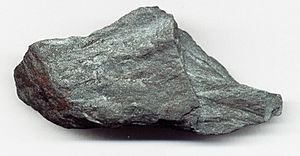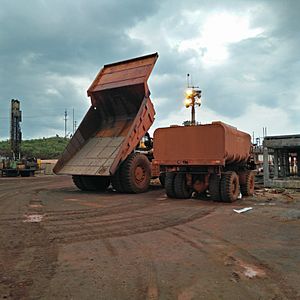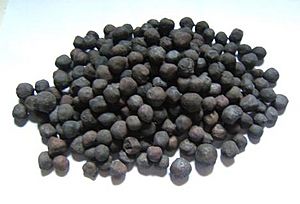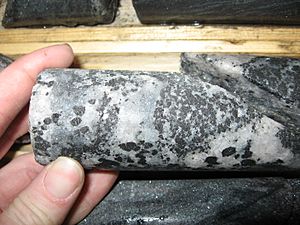Iron ore facts for kids
Iron ores are special rocks and minerals that contain enough iron to be dug up and used to make metal. These rocks are usually full of iron oxides, which are compounds of iron and oxygen. They can be many different colors, like dark grey, bright yellow, deep purple, or rusty red.
The iron inside these ores is often found in specific forms such as magnetite, hematite, goethite, limonite, or siderite. If an ore has a lot of hematite or magnetite (more than 60% iron), it's called "natural ore" or "direct shipping ore." This means it can go straight into a large oven called a blast furnace to make iron.
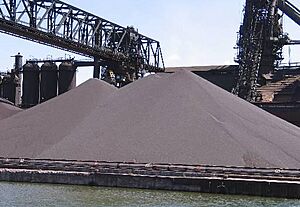
Iron ore is the main ingredient used to make something called pig iron. Pig iron is then used to create steel, which is a very strong metal. Almost all (about 98%) of the iron ore mined around the world is used to make steel. Many people believe that iron ore is one of the most important materials for the global economy, right after oil.
Contents
Where Iron Ore Comes From
You won't usually find pure metallic iron lying around on the Earth's surface. The only exceptions are tiny bits of iron-nickel alloys from meteorites or very rare rocks from deep inside the Earth.
Even though iron is the fourth most common element in the Earth's crust (making up about 5%), most of it is stuck inside other minerals like silicates or carbonates. It's very hard and takes a lot of energy to separate pure iron from these minerals. That's why industries mainly use iron oxide minerals, especially hematite, which are easier to process.
How We Started Using Iron Ore
Before the Industrial Revolution, people mostly got iron from easily found ores like goethite or bog ore. For example, during the American Revolution and the Napoleonic Wars, these were important sources. Ancient societies also used a type of soil called laterite to get iron.
For a long time, modern societies used mostly hematite deposits that were very rich in iron (around 70% iron). These were the "direct shipping ores" we talked about earlier.
After World War II, the demand for iron ore grew a lot, and the best hematite ores in the United States started to run out. This led to new ways of using lower-grade iron ore sources, especially magnetite and taconite.
Types of Iron Ore Deposits
The way iron ore is mined depends on the type of ore. Today, there are four main kinds of iron ore deposits that are actively mined:
- Magnetite deposits
- Titanomagnetite deposits
- Massive hematite deposits
- Pisolitic ironstone deposits
Main Iron Ore Minerals
Here are some of the most common minerals that contain iron:
- Magnetite (Fe3O4, contains 72.4% iron)
- Hematite (Fe2O3, contains 69.9% iron)
- Goethite (FeO(OH), contains 62.9% iron)
- Limonite (FeO(OH).n(H2O))
- Siderite (FeCO3, contains 48.2% iron)
Images for kids
 | Janet Taylor Pickett |
 | Synthia Saint James |
 | Howardena Pindell |
 | Faith Ringgold |


